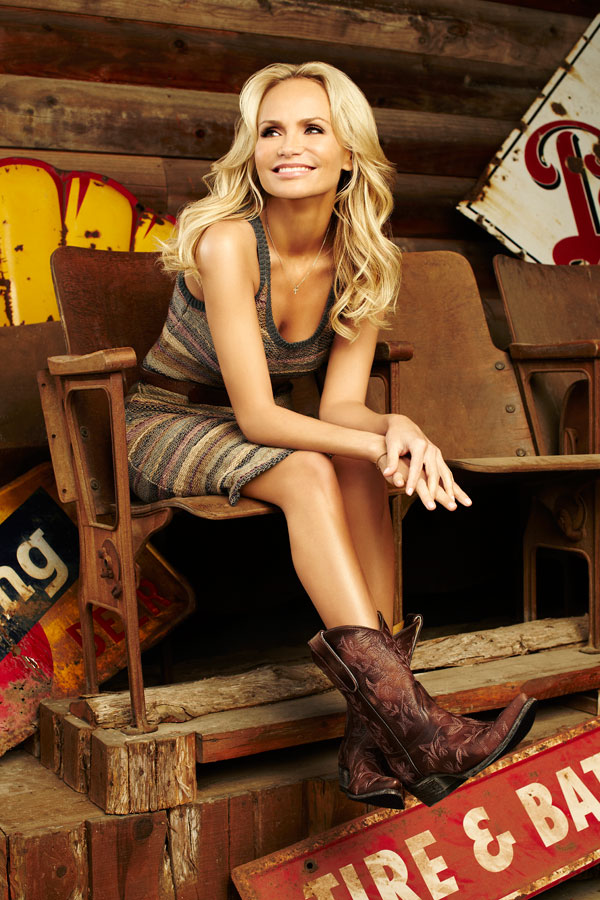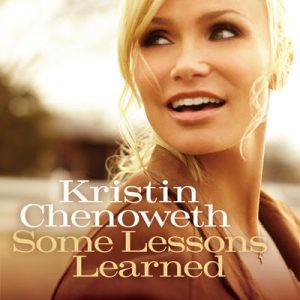Gay ally Kristin Chenoweth talks about her new country music CD (she adores Dolly!), queers … and the right way to be a Christian
Kristin Chenoweth doesn’t get miffed very easily. But when she does, watch out. Last year, after Newsweek published a commentary on the inability of gay actors to play straight roles, she wrote an extensive letter to the magazine, calling the article “horrendously homophobic.”
But Chenoweth’s allegiance to the gay community goes back to growing up in Oklahoma — a place she returned to for her latest album, Some Lessons Learned, the first of four where the opera-trainer singer fully embraces her country roots.
We had lots to talk about when we caught up with Chenoweth, on a dinner break from shooting her upcoming series, Good Christian Belles. She discussed her history of dating gay men, her opinion on Michele Bachmann’s support of gay conversion clinics … and being a little bit wicked.
— Chris Azzopardi
………………………..
Dallas Voice: Your character’s name on Good Christian Belles is Cockburn — Carlene Cockburn. Chenoweth: I can’t wait for my family to hear that one. Are you kidding? I was like, “Wait a minute…!” But I just think the most important thing for me as an actress, because of the lines that come out of my mouth, is to just have to speak them and keep going, because they’re so funny and her name is so funny and the whole thing is just so great. I love it.
Does your character have anything in common with April Rhodes, who you play on Glee? Probably not on paper, but they’re both pretty outlandish people. Carlene, though, is the antithesis of April.
You grew up in Oklahoma, so country music is your roots. How is your new album a reflection of that? It’s so funny, because I get asked, “Why a country album now?” But that’s how it all began for me. Of course, why would anyone know that? It’s not something I’ve been talking about a lot, but it’s the music I grew up listening to. One of my biggest influences is Dolly Parton, and when you look at the history of songs in musical theater and in country, they’re both usually great storytellers.
I know just how lucky I am to do this kind of music. Getting to go to Nashville and sing this music that feels like home to me was a real gift, and one that I don’t take lightly.
The song “What Would Dolly Do?” reminds me a lot of Dolly herself. I co-wrote that. [Producer] Bob Ezrin asked, “Who’s had the biggest influence on you country music-wise?” I said, “Dolly, without question.” And he said, “How would she approach it? Let’s think: What would Dolly do?” I said, “Bob, why aren’t we writing that song?”
There’s something about her that I feel very attuned to. There’s only one Dolly. I’m not comparing myself, but I’m just saying her spirit and the way she looks at life is pretty similar to me. And the cover I did of hers [“Change”] is actually a very emotional thing and it reminded me — of course, how could I ever forget? — what an amazing songwriter she is. You know, I didn’t do a lot of covers. I did two covers, one of Carrie [Underwood] and one of Dolly’s, and I just love both of them. I love their music, I love their spirit — everything they stand for.
It makes total sense, because, to me, both you and Dolly epitomize happiness. Oh my god, thank you. That’s the biggest compliment you could give me.
So, being so happy… what pisses you off? Oh, gosh! I don’t really get mad that often. But I’m not going to lie: When I do, there’s a quiet that comes over me that is a little like whoa, and that happens when I don’t feel other people are prepared or doing their job or pulling their weight. I come from a family where my dad came from nothing and worked hard to get where he is, and he said, “Work hard, play hard, Kris,” and I guess that’s kind of been my motto in life. So when I see people squandering opportunities or having a sense of entitlement, that really makes me crazy. Because I don’t understand it. It’s not a world I get.
One thing that does make you upset is homophobic people. I don’t like that, you’re right.
Your letter in response to that Newsweek column said it all. Why was it important to address your feelings on that issue? To be honest, I wasn’t prepared for what was going to happen. I was on Broadway doing Promises, Promises, and I read the article and I actually thought it was pretty irresponsible. I’m not even talking about whether a person agrees with being gay or not, I’m talking about artistry and gay
actors trying to play straight. It just made me mad, because I thought, “Well, I’ve played a prostitute, does that mean I am one? No.” I just thought it was a little bit of a bullying thing, and I honestly prayed about it — no kidding, I prayed about it.
And by the way, I’m a big fan of the magazine, which is why I was so bummed. But I think that they felt bad and hopefully there’s been some discussion about it and some learning, because that’s what we’re here to do on this Earth, to learn our purpose. Well, one of my purposes in this life — since I’m a believer and a Christian — is to help people realize that not every Christian thinks that being gay is a sin.
To reinforce your point, you made out with your Promises, Promises co-star Sean Hayes at the Tonys last year. It might’ve been a little jibe. It might’ve been a little one! Ha!
What was it like to make out with a gay man? Was that your first time? Well, let’s face it, my high school boyfriend is gay, so I don’t think it’s my first time making out with gay men! I bet a lot of women don’t even know they’ve done it! And Sean Hayes is just a darn good kisser, what can I say?
Wait, so you dated a gay man in high school? Yeah, and I’m like, “Well, that’s why we were such a great couple!” He didn’t pleasure me in any way but he helped me pick out my prom dress!
Was he one of the first gay people you knew in Oklahoma? Yeah. I want to tell you something I know about myself: When I was in the second or third grade, I first heard the word “dyke,” and it was in reference to a girl in our school who was very, very tomboyish. I didn’t really understand what the word was, but I knew I didn’t like the way it was said. And for some reason I’ve always been drawn to the person that was alone, and I don’t mean to make me sound like I’m Mother Teresa, because I’m not. But I’ve always been drawn to people who felt left out or different, and maybe it’s because, I too, felt different and unique. People would not think this of me, because there’s this perception of me that, “Oh, life’s been perfect and things have come so easily.”
But let’s face it: My speaking voice is very interesting. Yes, I was a cheerleader but I also wanted to do all the plays, I was in renaissance choir, and, I too, felt a little bit like an outsider. I was always drawn to people who felt that way, too. And sure, some of them were gay and I never did understand — I guess the word is fear.
God made us all equal. He made me short, he made someone gay, he made someone tall — whatever it is, it’s not a sin; it’s how we’re made. And that’s the way I feel about it. It flies in the face of a lot of what Christians believe, but as I’m finding out there’s a lot of Christian people who think the same as me. So that’s my deal, and I think we should not be careful of the unknown but rather accepting and loving of it.
As someone who’s Christian and supports the gay community, how do you feel about the pray-away-the-gay program that Michele Bachmann supports? [Long pause] You know what, you can have your opinion. One of the great things about being in this country is we get to freely say what we believe. I just don’t happen to agree with that. Though I like the “pray” part!
This article appeared in the Dallas Voice print edition September 16, 2011.














great, talented and wise woman!!